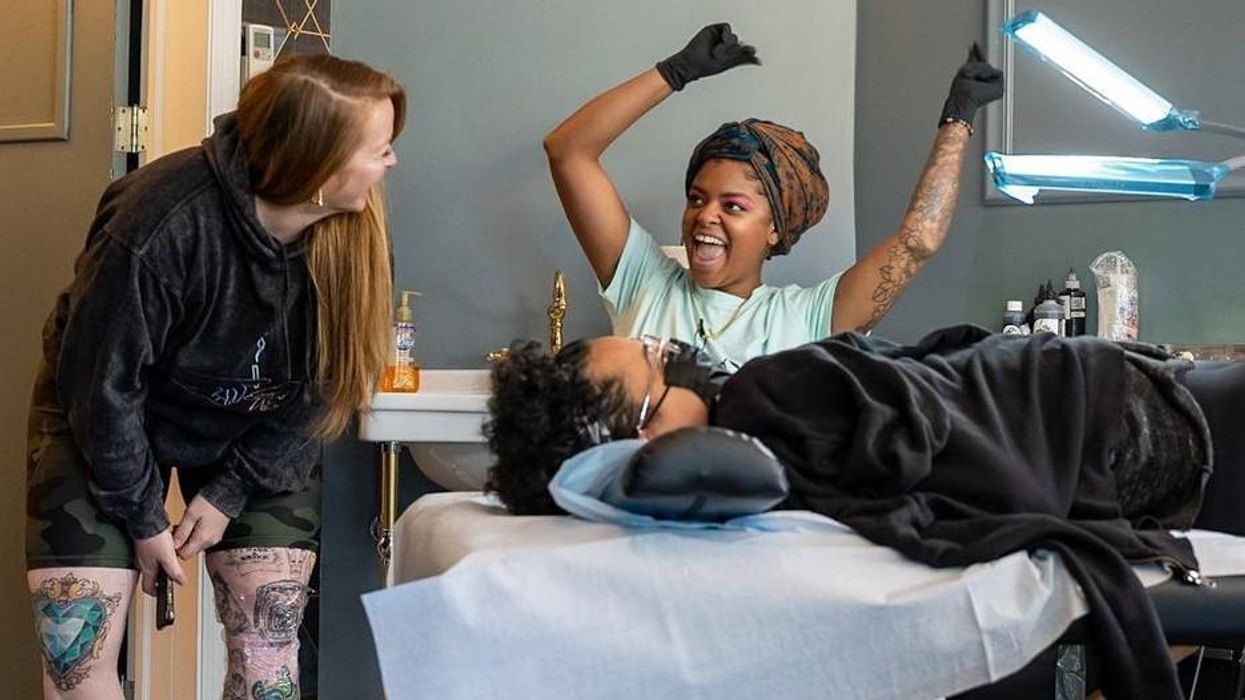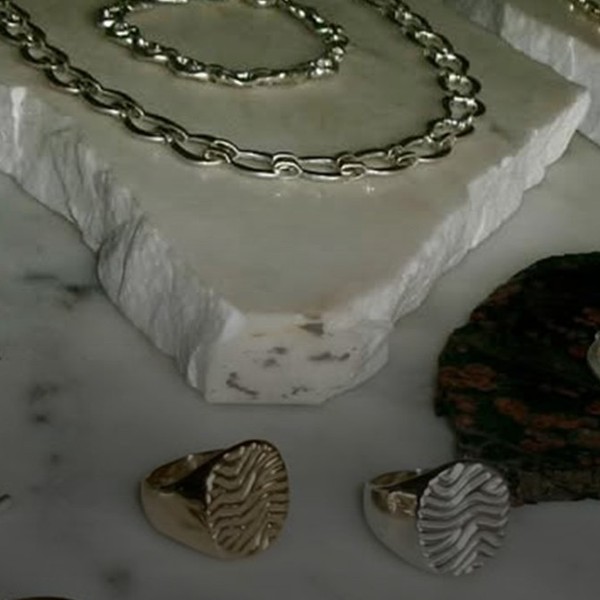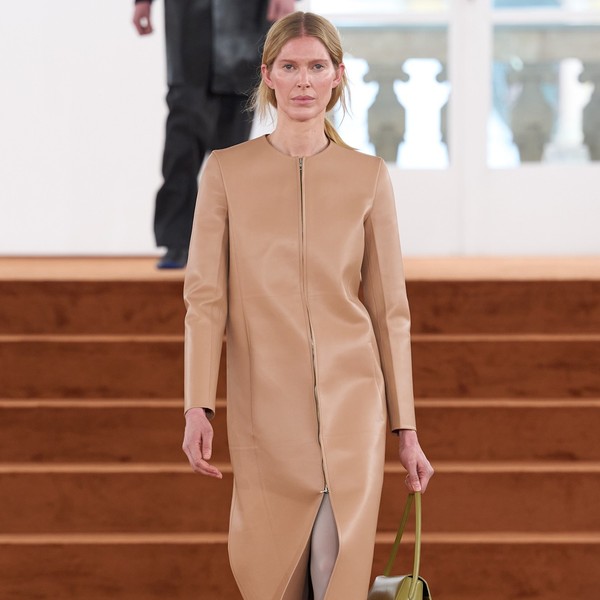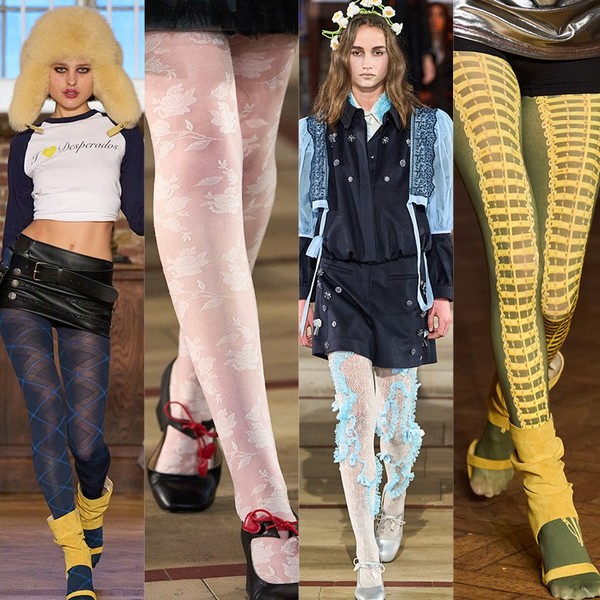High Hopes Tattoo Is Providing a Safe Space for the Queer Community
The queer, female-owned Brooklyn studio is reimagining the traditional tattoo shop.

For many, including myself, tattoos are a representation of bodily autonomy—they’re a choice, something we can put on ourselves that shows our ability to reclaim ownership and control over how we present ourselves. That’s why the environment in which you get a tattoo is so important. Depending on where you get a tattoo, it can be a painful experience; you’re in a vulnerable situation and you have to place your trust in the hands of another person, someone who is usually a stranger. No one wants to feel judged, questioned, or discriminated during such an intimate process.
In America, tattooing has been a typically male-dominated industry; an old boy’s club with an air of hypermasculinity and exclusivity. Tattoo shops were once a space where not everyone felt included, safe, or respected. However, thanks to social media and a changing political and sociocultural environment, the industry has made serious shifts over the past few years. There are more women and queer people tattooing, and getting tattoos, than ever before. And they’re creating inclusive spaces where a sense of community and comfort are key. Ashley Ketner, founder of High Hopes Tattoo—a queer, female-owned tattoo studio in Bushwick, Brooklyn—is one of those people.
“It was important to give queer artists a place to work that really supported and encouraged every part of their individuality,” says Ketner. “High Hopes serves as a pillar for the queer community to gather and cultivate creativity in a safe environment.”
Below, in her own words, Ketner explains how she entered the tattoo world, why she decided to open High Hopes, and how she’s working to create a more inclusive industry.
I've always loved tattoos, but growing up in North Carolina, in a conservative family, there was always this idea that if you get a tattoo you're never going to get a job. When I was able to go out and experience life for myself, I realized that, actually, plenty of people have tattoos and also have amazing careers.
[I received] my first tattoo when I was 18 years old, but I started to express myself through tattoos in 2013. I was in college and my roommate was like, "Let’s get tattoos, I’ll pay for them." So of course I said yes. I got the first tattoo of what would later become a sleeve and I knew that this culture of body modification and expressing yourself in a way that is not necessarily easy to do was something I was really into. I mean, not everybody can sit through a tattoo, right?
In 2019, I moved to New York because of a sales job. A tattoo artist I followed on Instagram, Bobby Coyote, was doing a short-term residency at a shop in Williamsburg. I’d fangirled over Bobby for forever, so I reached out, got an appointment, got tattooed by him, and we hit it off. We had a great connection. I asked him, "Can we take you out for a beer later tonight?" And he came later that night to meet us at a Lot45 gay prom party.
He brought another tattoo artist, Monica Velvet, with him and she became one of my really good friends. From there, I started to meet all these amazing queer tattooers in the New York area. And I thought, why aren't all these people at the same shop? That would be ideal—to have a space for a queer community of artists where they can feel safe. So that's how I first got into it. The desire to be a business owner has always been there. Knowing it would be in a creative space that has always been there. Did I always know it was going to be a tattoo shop? No, but that kind of presented itself.
The first wave of people that worked at High Hopes were friends of mine; they’ve since moved on and created their own private studios and we're pumped about that. But it's always been about getting people in here that are the right vibe. I'm not going to have somebody here that throws off the energy. I would rather hire an artist that isn't as seasoned, if their attitude and energy is better.
I get a lot of grief for not being a tattoo artist yet still owning a shop. This particular part of Brooklyn [where the shop is located] is home to a lot of super American traditional tattoo shops. They’re very loyal to the art and its tradition. And if you don't tattoo, to them, what business do you have being an owner? I’ll introduce myself to somebody and say, "I own High Hopes" and they're like, "Oh, dope. I heard about that shop, show me your work." When I reply, "I don't tattoo," there’s definitely judgement passed.
I understand why they feel that way, but I’m not trying to make a million dollars off of High Hopes. I want to have a space for queer artists, queer people, and everyone to feel safe and seen and heard, and have a really cool experience while they're here. That's what I'm trying to provide.
For example, one of our artists has a lot of trans clients. At his old shop, not all of his clients felt comfortable coming in. It was more of a walk-in shop and there were a lot of male artists—you just don't always know what's going to come out of somebody's mouth. After he joined our staff, I noticed that there were a lot more trans clients that started to come here because they felt comfortable in our space. They don’t have to worry about derogatory comments, being misgendered, or any sly remarks.
When you come into the shop, it feels welcoming. The colors in the space were chosen on purpose; they all evoke a sense of calm. Our crew is really nice and they have great bedside manner. There is also zero tolerance for any harassment or negativity towards any type of inequality behavior. This is a safe place. I feel like a lot of shops that you walk into can be really intimidating and I wanted to create the opposite. The future of High Hopes is to continue to create amazing art and operate a place that is safe for our queer community.




